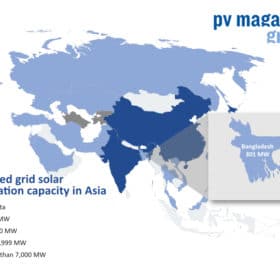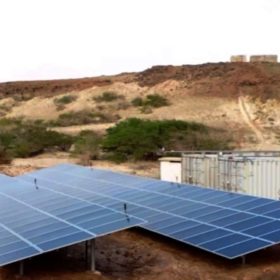Industry reacts to production-linked solar incentive scheme
Solar manufacturers have welcomed the bidding criteria which apply to the incentives offered for setting up gigawatt scale, high-efficiency PV production lines but would like a bigger budget, to finance significant capacity build-up.
Government to finance 100 MW Bangladeshi solar plant
The federal government will provide INR968 crore of soft loans for a INR1307 crore, 100 MW solar park near the Jamuna river in Bangladesh’s Jamalpur district, where a second park of a similar size is being planned by Dhaka and a Chinese partner.
India installed 3.2 GW of solar in 2020
In large-scale solar, Adani was the largest developer by capacity, and Sterling & Wilson the preferred EPC partner. Tata Power Solar led in rooftop solar installations.
MNRE spells out the rules for its production-linked incentive scheme
Solar manufacturers who wish to apply for state cash to set up production lines must meet minimum requirements for manufacturing scale and module efficiency, and must produce at least solar cells and modules to be shortlisted. They will then bid for the amount of incentives they want over a five-year period, with extra weight given to applicants who will manufacture more of the supply chain, from polysilicon downwards.
RattanIndia forays into electric vehicle space
The private-sector power producer is investing an aggregate INR 150-crore amount into Revolt Intellicorp, a next-generation electric mobility company, as part of its strategy to diversify into new business avenues.
US-based EverGreen Power to assess feasibility of 300MW wind-solar-storage project in Gujarat
The U.S. Trade and Development Agency (USTDA) is funding the 300MW wind-solar-storage project as part of its mission to promote sustainable infrastructure projects in partner countries like India.
Fourth Partner Energy secures INR 250 crore from UK investor CDC Group
The Hyderabad-based developer shall use the capital to expand its solar portfolio as it targets 3 GW of PV capacity across all its verticals by 2025. The investment, in the form of non-convertible debentures, marks CDC’s foray into India’s commercial and industrial solar segment.
Solar 101: Is my roof ready for solar?
In this series, we’ll break down the decision-making process into bite-sized pieces so you can navigate the process and feel good about your choices.
Green taxonomy first step towards building a resilient society
The second wave of Covid-19 reminds us to build a resilient society. Climate Change, not unlike Covid-19, will deliver devastating effects to our planet and disrupt our way of life. So, in this climate decade, India must channel investments into sustainable activities. The first step is to construct a robust “green taxonomy” – a green list of sustainable activities.
PV-powered desalination system for rural areas
Italian start-up Genius Watter has developed a solar desalination solution that is claimed to be particularly suitable for remote areas with no connection to grid electricity. The system is able to produce up to 1,000 cubic meters of potable water per day at an opex of €0.20 per cubic meter.












